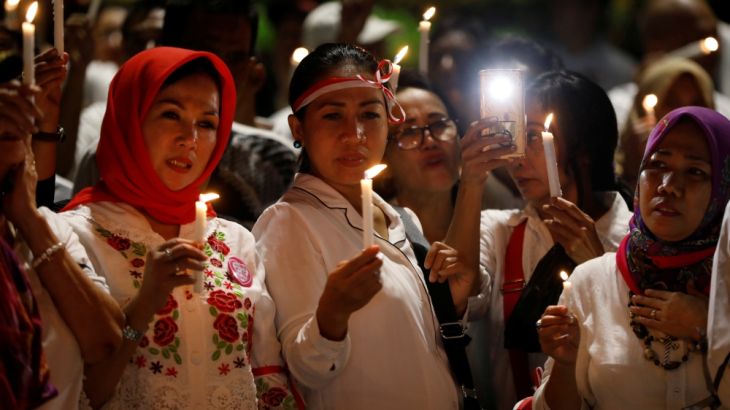What is behind the Surabaya attacks in Indonesia?
Police suspect prison siege claimed by ISIL in Jakarta linked to recent bombings in Surabaya.

Surabaya, Indonesia – Ani hasn’t been able to sleep since she found out she was living next to a house full of explosives.
Ani is not her real name – she is too scared to reveal her identity.
For seven years, she was a neighbour of Dita Oeprianto and Puji Kuswati and their four children at a housing complex in Surabaya, Indonesia’s second largest city.
Ani and Puji often exchanged recipes and discussed their children’s school results. Ani said she admired her neighbours for raising their children to be polite and kind human beings.
On Saturday, while her nine-year-old daughter was playing outside, Puji told Ani she could pick star fruits from a tree in her garden any time, without asking for permission.
Now, Ani has realised that this was Puji’s way of saying goodbye.
Church attacks
On Sunday morning, Dita, Puji and their children left their house with bombs strapped to their bodies.
Dita dropped off his wife and two young daughters at a church in their hometown and drove to another one by himself.
Their two teenage sons took a motorcycle to a third church.
Minutes apart, all the family members blew themselves up.
Dita’s old friends told local newspapers that he had strong religious ideas since a young age and refused to sing the Indonesian anthem.
Ani said her neighbours never talked about their religious views and when she would bring up the topic they would quickly change it.
‘Revenge attacks’
The attacks reminded many in Indonesia of the early 2000s when bombings killed hundreds on the island of Bali and in the capital, Jakarta.
Although smaller attacks have happened since then, the arrest of hundreds of fighters in the past 15 years has made Indonesians feel safer.
|
|
Things appear to have changed now though, with the turning point being a prison riot at a high-security jail near Jakarta on May 8.
A group of 156 prisoners, all detained on “terrorism” charges, managed to take guards from the highly-trained anti-terror police hostage and kill five of them.
After a two-day standoff, all of them surrendered but not before they had sent live images to social media accounts linked to the Islamic State of Iraq and the Levant (ISIL, also known as ISIS) group, which claimed responsibility for the siege.
ISIL’s leadership consequently urged its supporters in Indonesia to commit attacks wherever possible in support of the siege.
Police believe the attacks in Surabaya were a direct result of this call.
A group calling itself Jemaah Ansharut Daulah (JAD), headed by Aman Abdurahman, pledged allegiance to ISIL in 2014.
The hard approach of arresting people is not enough; we will need to fight their ideology.
Abdurahman has been in prison for the majority of the past 12 years. He is currently on trial for planning an attack at a Starbucks coffee outlet in Jakarta from behind bars in 2016.
Indonesia’s prison system is notorious for being over capacity and lacking security. Prisoners are often found using mobile phones with access to the internet.
Ali Fauzy, the youngest brother of two men executed for planning the attacks in Bali 16 years ago, told Al Jazeera that police actions following the prison siege angered many ISIL supporters in Indonesia.
“Images were shown of police spoon-feeding prisoners while their hands were cuffed,” he said. “Also social media accounts calling them terrorist dogs has led to these revenge attacks.”
‘Disease of terrorism’
Fauzy, who used to be a bombmaker for Jemaah Islamiyah, the group responsible for the Bali attacks, is now working with police.
He heads a foundation called Peace Circle, which is running a deradicalisation programme with 80 former convicts in “terrorism” cases.
Although he said he knew JAD members, Fauzy added that it was difficult for him to reach out to them because of ideological differences – Jemaah Islamiyah used to be linked to al-Qaeda, while JAD is connected to ISIL.
“Most of the old Jemaah Islamiyah members consider ISIL khawarij, meaning their enemy is anyone who does not agree with them. So, what we have seen in the past years is a split between these groups,” said Fauzy.
He added that the “disease of terrorism in Indonesia is facing serious complications which need specialists to solve.
“The hard approach of arresting people is not enough; we will need to fight their ideology.”
In contrast to Jemaah Islamiyah members, police seem to have difficulties spotting JAD members, who appear to be able to blend in perfectly with their surroundings.
That was also the case with Dita and Puji, who managed to guide their young children to lead a double life among their friends and neighbours.
“These children have been brainwashed from a young age,” Fauzy argued.